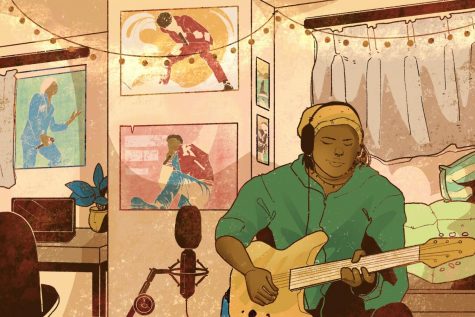Online music courses ‘not ideal,’ but produce ‘great opportunities ahead’
This article is part of the Chronicle’s series “Difficult to Transfer” in which we explore how departments are transitioning arts-based courses online due to the coronavirus, or COVID-19, pandemic.

Cords snake along an apartment floor connecting laptops, monitors, amps, pedals, guitars and other equipment needed for an online private music lesson.
Luckily, Nick Bilski, a senior music major with a concentration in guitar, is used to setting up shop in his home to participate in online music lessons. With loops—cuts of music that can be repeated—pre-recorded by professors, Bilski said he completes lessons online efficiently, only experiencing slight delays in audio.
Bilski said although meeting over a Zoom call is not an ideal situation, it works for the time being. He said he is fortunate to have the necessary equipment, but some music majors are not as lucky.
As a junior contemporary, urban and popular music major with a concentration in drumming, Cameron Carlson cannot practice on a real drum set since moving home for the remainder of the semester because his parents work from home. So, for now, he practices on a mesh pad that hardly makes noise when he hits it. He said it will give him the opportunity to train his hands and focus more on technique.
“It’s obviously not the same … [but] all musicians are trying to find ways to be creative,” Carlson said.
Sebastian Huydts, acting chair of the Music Department, said in a Friday, April 10 email to the Chronicle that no courses within the department have been canceled as a result of the online transition.
“I believe students will end the semester [with] some great promotional materials for themselves, videos and recordings and the accompanying skills that might not have been as far developed under ordinary circumstances,” Huydts said in the email.
Huydts said students were offered portable keyboards during the first two weeks of the campus closure and that the department has loaned equipment to students if there were no alternatives available, such as double basses, amps and drum pads.
Huydts said while he wishes the new challenges would have come more gradually, he is confident everyone will realize the “great opportunity ahead” and focus on the positive aspects “these otherwise tragic circumstances have brought us.”
Typhanie Coller, an adjunct faculty member in the Music Department, said the department has been proactive in making the transition smooth, and she felt prepared for the switch.
Coller teaches “Vocal Techniques” I and II, as well as private vocal lessons, and is an ensemble director and coordinator. She said it still feels as though she is in the room with her students.
“There is nothing that is truly compromised except for the fact that when it comes to performing repertoire, I’m not able to play the keyboard for them,” Coller said.
As a musician, Coller said there is nothing that can replace live performance. There are ways to make ends meet, though, by continuing the ensemble, having students individually record their parts and putting it together for a compilation project.
Still, Coller said she feels confident the learning outcomes will be effectively met by the end of the semester.
Marcus Bailey, a sophomore contemporary, urban and popular music major, said the way courses have transitioned online has put more pressure on students, making it harder to get the necessary work done.
Bailey said the college needs to better structure these courses and be understanding or more “lenient” with students.
“It’s kind of like we’re getting hit with a double dose of, ‘Hey, you’re gonna get a little screwed over right now,'” Bailey said.
Alexis Ploen, a senior contemporary, urban and popular music major, said a large portion of her assignments include writing music in groups and performing it for the class, which is not as effective online.
She has also been given supplemental work such as watching music-related documentaries or researching artists in place of performing.
Ploen said it is irritating to get extra work just because students are home, and that it does not mean they have endless time to work on more assignments. She added that the Zoom meetings for class are “unfulfilling,” and she questions if she is really getting what she should be out of the course.
“Music is such a performance art,” Ploen said. “If we don’t have the opportunity to actually do that with the band and play off of each other … we’re really missing out on a huge part of what that experience should be.”

